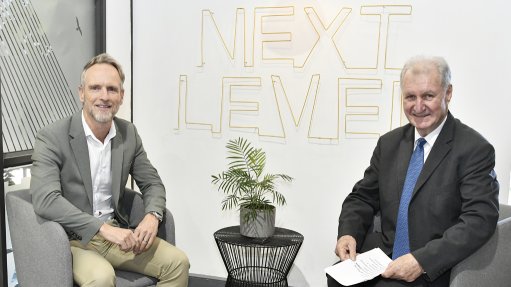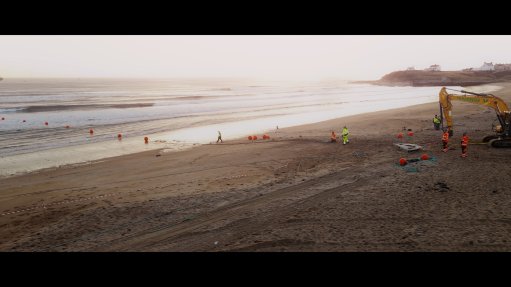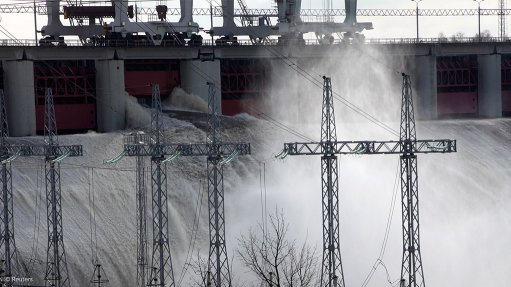Potential of industrial refrigeration service model emphasised


DAWIE KRIEL Under the CaaS model, customers enter into partnerships where suppliers own and operate cooling or heating systems, assuming all associated risks and responsibilities during the life cycle of the system
Energy company Energy Partners has outlined the potential of Cooling-as-a-Service (CaaS) agreements within the industrial refrigeration landscape to catalyse developments in energy efficiency, thereby leading to sustainable businesses.
The company highlights that CaaS is increasingly popular in industrial refrigeration. By “exchanging ownership for usership” and transferring operational risks to suppliers, companies can focus on their core business while profiting from the latest innovations in refrigeration technology.
Energy Partners refrigeration GM Dawie Kriel notes that, in recent years, the industrial refrigeration landscape has undergone a significant transformation driven by the emergence of servitisation models.
He notes the “profound opportunities” that CaaS opens up for suppliers, customers and financiers, and the dynamic impact it can have on operational risk, energy efficiency and sustainability.
He cites, for example, that servitisation fundamentally redefines the relationship between suppliers and customers by offering outcomes rather than products. “Under the CaaS model, customers enter into partnerships where suppliers own and operate cooling or heating systems, assuming all associated risks and responsibilities during the life cycle of the system.”
Consequently, customers do not need to make a large initial investment, but, for example, pay a fixed rate per kilowatt of cooling capacity. This rate includes maintenance and repairs, with the supplier guaranteeing availability and, possibly, even having to pay penalty fees for any downtime.
Such a shift represents a paradigmatic change and inherently leads to reduced life- cycle costs, enhanced operational efficiency and a focus on sustainable practices.
CaaS is primarily a risk transfer product and not merely a tool to finance equipment. It is driven by operational efficiency, which ensures the lowest life-cycle cost and unlocks profitability for both supplier and end-user, while ensuring environmental sustainability.
Moreover, the CaaS income model incentivises the supplier to ensure efficiency improvements, reduces energy consumption, and promotes the adoption of sustainable technologies.
Consequently, product quality is improved, leading to increased profitability for both customer and supplier.
Enabling Innovation an Environmental Imperative
With energy efficiency being a key competitive advantage in CaaS, suppliers are driven to lead in technological innovation and smart energy asset management. They manage the complex challenges of addressing diverse equipment needs, ensuring compatibility, and meeting stringent regulatory requirements.
Suppliers are prompted to enhance their service through comprehensive data management, real-time performance monitoring, and centralised asset management. Further, as they have commissioned the system and continuously collect operating data, they can advise customers on how to further improve efficiency or reduce energy waste.
At the same time, such a stringent customer-focused approach limits their own investment risk, because they have too much to lose if the customer gets into financial difficulties.
The environmental impact of traditional refrigeration systems underscores the urgency for more sustainable solutions. CaaS addresses this concern by prioritising efficiency improvements and the adoption of natural refrigerants: not only do they comply with all legal regulations, but they are the most cost-effective for the foreseeable future.
CaaS also aligns with environmental, social and governance reporting requirements, enhancing the environmental credentials of customers and contributing sustainable development. Kriel asserts that CaaS is therefore a ‘win-win-win’ solution: for the customer, the supplier and the environment.
CaaS in Africa
Africa offers good examples of the benefits of CaaS: the continent faces unique challenges in electricity supply, cold chain infrastructure and food security. With CaaS, small companies and projects can invest in cold rooms, storage and transport, and are less affected by power outages.
Kriel cites the adoption of CaaS at dairy company Clover, noting that it serves as a compelling example of the transformative impact of servitisation models.
Energy Partners provided a 10 MW two-stage ammonia cooling plant with a 1.6 MW solar power system for its factory in Queensburgh, in KwaZulu-Natal.
It achieved 40% cost savings, improved efficiency, and reduced carbon emissions through heat recovery and the use of solar power. It is now the first fully servitised refrigeration, steam and power plant, highlighting the potential of CaaS to drive sustainable growth and innovation in the dairy industry and setting a precedent for other companies to follow.
Financial Perspective
Kriel says that financial institutions can play a crucial role in facilitating the adoption of CaaS by providing innovative financing solutions. Investors are looking for investments in viable energy sector projects and CaaS provides reliable returns in sustainable technology.
He suggests that, as the industry continues to evolve, the integration of heat pump technologies and continued collaboration between stakeholders will further enhance the value proposition of CaaS.
By embracing servitisation models, stakeholders can unlock new avenues for efficiency, sustainability and shared success. “As we navigate this paradigm shift, let us seize the opportunity to build a more resilient, innovative and sustainable future for all, harnessing the power of CaaS to drive positive change,” Kriel concludes.
Article Enquiry
Email Article
Save Article
Feedback
To advertise email advertising@creamermedia.co.za or click here
Comments
Press Office
Announcements
What's On
Subscribe to improve your user experience...
Option 1 (equivalent of R125 a month):
Receive a weekly copy of Creamer Media's Engineering News & Mining Weekly magazine
(print copy for those in South Africa and e-magazine for those outside of South Africa)
Receive daily email newsletters
Access to full search results
Access archive of magazine back copies
Access to Projects in Progress
Access to ONE Research Report of your choice in PDF format
Option 2 (equivalent of R375 a month):
All benefits from Option 1
PLUS
Access to Creamer Media's Research Channel Africa for ALL Research Reports, in PDF format, on various industrial and mining sectors
including Electricity; Water; Energy Transition; Hydrogen; Roads, Rail and Ports; Coal; Gold; Platinum; Battery Metals; etc.
Already a subscriber?
Forgotten your password?
Receive weekly copy of Creamer Media's Engineering News & Mining Weekly magazine (print copy for those in South Africa and e-magazine for those outside of South Africa)
➕
Recieve daily email newsletters
➕
Access to full search results
➕
Access archive of magazine back copies
➕
Access to Projects in Progress
➕
Access to ONE Research Report of your choice in PDF format
RESEARCH CHANNEL AFRICA
R4500 (equivalent of R375 a month)
SUBSCRIBEAll benefits from Option 1
➕
Access to Creamer Media's Research Channel Africa for ALL Research Reports on various industrial and mining sectors, in PDF format, including on:
Electricity
➕
Water
➕
Energy Transition
➕
Hydrogen
➕
Roads, Rail and Ports
➕
Coal
➕
Gold
➕
Platinum
➕
Battery Metals
➕
etc.
Receive all benefits from Option 1 or Option 2 delivered to numerous people at your company
➕
Multiple User names and Passwords for simultaneous log-ins
➕
Intranet integration access to all in your organisation



















